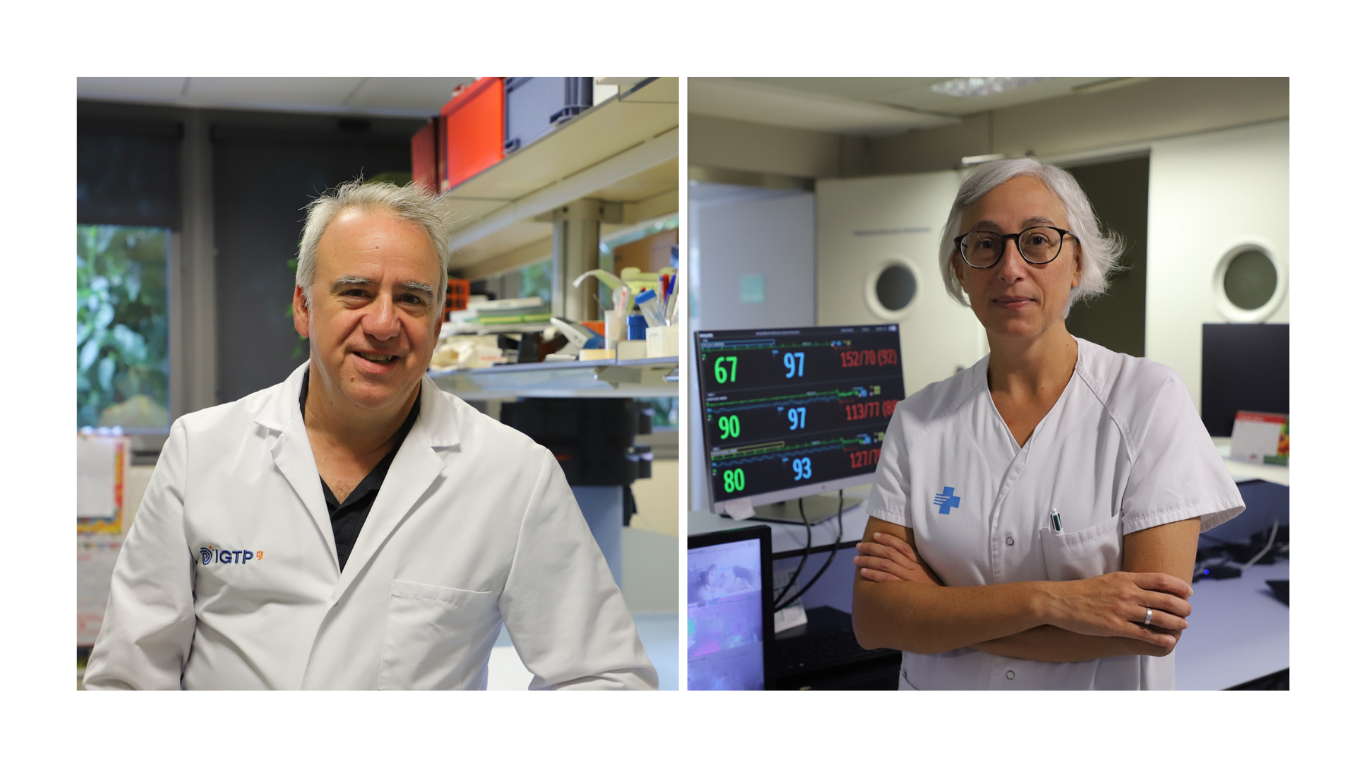Two projects from IGTP funded by ”la Caixa” Foundation to transition their innovative research from the laboratory to patients

The first urine test that detects kidney fibrosis as an alternative to kidney biopsies, an initiative from the IVECAT group, and a project applying artificial intelligence to rapidly categorise stroke patients and enhance their recovery chances, from the Neurovascular Research group, are two of the fifteen projects from Catalan research centres selected within the 2023 call of the new CaixaImpulse Healthcare Innovation programme.
The first urine test that identifies kidney fibrosis as an alternative to kidney biopsies, a project by the Innovation in Vesicles and Cells for Therapeutic Application (IVECAT) research group at Germans Trias i Pujol Research Institute (IGTP), and a project leveraging artificial intelligence to swiftly categorise stroke patients and improve their recovery outcomes, led by the Neurovascular Research group at IGTP, are among the fifteen chosen as part of the 2023 CaixaImpulse Healthcare Innovation programme. "la Caixa" Foundation will allocate €3.3 million to drive 29 innovative biomedical projects with the potential to reach both the market and society. These are projects from 20 research centres, hospitals, and universities in Spain and Portugal.
In addition to the two projects from IGTP, this year's call has selected projects led by research centres in Barcelona, Tarragona, and Girona: Universitat de Girona (UdG), Centre de Regulació Genòmica (CRG); Vall d'Hebron Institut d'Oncologia (VHIO); Universitat de Barcelona (UB); Institut d'Investigació Sanitària Pere Virgili (IISPV); Institut de Ciència de Materials de Barcelona (ICMAB-CSIC); Vall d'Hebron Institut de Recerca (VHIR); Institut de Recerca Biomèdica (IRB Barcelona); Hospital del Mar Research Institute (IMIM) y Fundació Institut d'Investigació i Innovació Parc Taulí (I3PT).
The award recipients-out of over 300 applications received-were assessed by a panel of international experts and professionals in the life and health sciences domain.
By business area, for projects led from Catalonia, 7 out of 15 projects fall under therapies, 5 under diagnostics, 2 under digital health, and 1 under medical devices. Regarding the funding, award recipients are granted, based on the project's maturity level, between €50,000 and €500,000 to progress over the next 2 years. In this call, 7 Catalan projects entered phase 1 (up to €50,000); 6 into phase 2 (up to €150,000), and 2 into phase 3 (up to €500,000). The programme ensures that when projects hit specific development milestones, and following an assessment by the evaluation committee, they can progress to subsequent phases with increased funding.
First urine test to detect kidney fibrosis as an alternative to kidney biopsies
- Project leader: Francesc E. Borràs, co-leader of the research group on Innovation in Vesicles and Cells for Application in Therapy (IVECAT) at IGTP
- Funding received: €300,000 (phase 3)
Chronic kidney disease affects approximately 15% of the global population and is closely linked to cardiovascular risk factors and chronic conditions such as diabetes and obesity. It is a disease that quietly progresses towards dysfunction and renal failure, ultimately requiring highly disabling and costly renal function replacement therapies, such as dialysis and transplantation. The primary driver of chronic kidney disease progression is the gradual accumulation of extracellular matrix in the kidneys, known as kidney fibrosis.
Although this disease currently remains incurable, prevention and early detection can aid in delaying or even halting its progression. However, existing analytical parameters do not reflect fibrotic injuries, so the standard diagnostic method remains the kidney biopsy, an invasive procedure with significant limitations preventing optimal patient monitoring.
The project team has identified a correlation between vitronectin levels in urine and the extent of kidney fibrosis. Based on this observation, they are developing a test for diagnosing and monitoring kidney fibrosis using urine samples. This offers a non-invasive alternative that overcomes most drawbacks of kidney biopsies. The researchers will produce two versions of the test: one for rapid detection usable in healthcare centres, and another designed for clinical laboratories, which will provide a more precise evaluation of vitronectin levels.
Artificial intelligence to rapidly categorise stroke patients and enhance recovery prospects
- Project leader: Natalia Pérez de la Ossa, co-leader of the Neurovascular Research group at IGTP
- Funding received: €50,000 (phase 1)
Stroke is a highly prevalent condition, affecting 15 million people globally each year. In 40% of cases, it is caused by an occlusion in one of the brain's major arteries and can be effectively treated with endovascular therapy. However, only a few highly specialised hospitals with experienced staff offer this treatment. It is estimated that half of the patients are initially transferred to centres not equipped to provide this therapy, leading to significant treatment delays, unnecessary healthcare costs, and worse outcomes for patients. On the other hand, 25% of strokes are haemorrhagic, requiring swift attention at the nearest hospital where measures can be initiated to reduce bleeding.
In all stroke cases, response time is crucial, and chances of neuronal tissue recovery demand a prompt and accurate approach to characterisation and treatment. Employing artificial intelligence in the pre-hospital setting, specifically within ambulances, can be pivotal in determining the type of stroke and the required treatment for each patient, thereby facilitating personalised decisions that enhance patient transfer management and optimise this process.
Currently available pre-hospital stroke severity assessment tools, like the RACE scale previously developed by this research group and implemented worldwide, rely on clinical scales to measure symptom severity but have limited diagnostic capability. This project proposes the development of RACE-Plus, a new app tailored for the pre-hospital environment (ambulances), enabling the prediction of a patient's type of stroke using AI algorithms. This would then direct patients to the healthcare facility best suited to ensure optimal clinical recovery. The researchers anticipate that accurate patient categorisation and their consequent transfer to the appropriate hospital could increase access to endovascular therapy by up to 20% and expedite treatment by 2 hours. This could result in a 10% boost in recovery chances.
